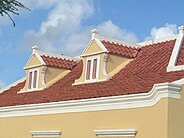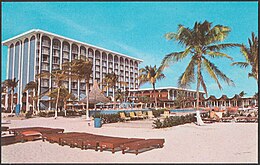The culture of Aruba, encompassing its language, music, and cuisine, is diverse and has been influenced by both regional and foreign cultures. One significant foreign influence originates from the Iberian Peninsula, which had a significant impact on the island for approximately 137 years, starting c. 1500. These influences were characaterized by a strong religious presence, missionary activities, and economic exploitation.[1]
Since 1636, during the Eighty Years' War (1621–1648), the Dutch played a crucial role in shaping Aruba's identity, driven by their exploratory and mercantile spirit, contributing to the island's modern character.[1]
The Aruban tourism industry dates to the 1930s when the first commercial airline landed on Aruba and a guest house was established in Oranjestad. Starting in the early 1960s with the rise of a new wave in the tourism industry and the opening of the first luxury resort, Aruba Caribbean Hotel, a national aspiration arose to become "The little Miami of the Caribbean". However, this focus on developing a small island tourism economy (SITES or SIDS) led to rapid and uncontrolled expansion of the tourism sector. As consequence, it brought about a range of socio-ecological challenges and disrupted the sociocultural fabric of the island, known internationally as "One Happy Island".[3][4]
- ^ a b Alofs, Luc (2018). Koloniale mythen en Benedenwindse feiten : Curaçao, Aruba en Bonaire in inheems Atlantisch perspectief, ca. 1499–1636. Leiden : Sidestone Press. ISBN 978-90-8890-602-2.
- ^ "Historia di Aruba – Tourism". www.historiadiaruba.aw. Retrieved 2023-10-04.
- ^ Peterson, Ryan R. (2023-06-01). "Over the Caribbean Top: Community Well-Being and Over-Tourism in Small Island Tourism Economies". International Journal of Community Well-Being. 6 (2): 89–126. doi:10.1007/s42413-020-00094-3. ISSN 2524-5309. PMC 7643527. PMID 34723109.
- ^ Centraal Bureau voor de Statistiek Aruba; Derix, Ruud (2016). The history of resource exploitation in Aruba : Landscape series 2. Oranjestad: Centraal Bureau voor de Statistiek.





